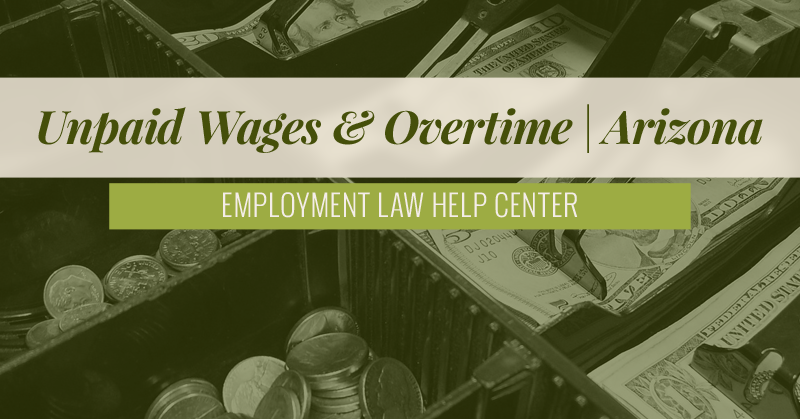Arizona Unpaid Wages and Overtime
Federal labor laws dictate not only the payment of basic minimum wage to employees across the United States, but they also regulate how many hours an employee can be required to work and how much extra in wages they are entitled to for any overtime hours worked during a single workweek. They also offer civil remedies for employees whose employers fail to pay them on time or pay the total wages they are owed. If you believe you are entitled to unpaid wages, overtime pay or benefits from your employer in Arizona, contact a skilled employment law attorney as soon as possible to discuss filing an unpaid wages claim, which can help you recover back pay and any other wages you are owed by your employer.

Unpaid Wages in Arizona
Under Arizona law, an employer may only withhold an employee’s wages when the employer is required by state or federal law, when the employer has the employee’s prior written consent, or when there is a reasonable good faith dispute as to the amount of wages the employee is owed. An employer who fails to pay the state minimum wage in Arizona is required to pay the employee the wages due with interest, plus an additional amount equal to twice the amount of unpaid wages owed. If an employer retaliates against an employee for trying to enforce his rights under state or federal wage laws, he may be entitled to no less than $150 a day for each day the violation occurred, or until a legal judgment against the employer is finalized.

Arizona Overtime Pay
In Arizona, there is no state overtime law, but if an employee is covered by the Fair Labor Standards Act (FLSA), federal overtime laws apply. Under the FLSA, there is no limit to the number of hours an employer can require an employee to work in one workday or workweek. However, employees in Arizona and across the United States are entitled to an overtime rate of one-and-one-half-times their regular rate of pay for all hours worked in a workweek in excess of 40, unless the employee is otherwise exempt from the FLSA’s overtime requirements. As long as the employee does not work more than 40 hours in a single workweek, an employer is not required to pay overtime to an employee who works more than eight hours in one day, or works on a Saturday, Sunday or holiday. In some cases, employers and employees may enter into a contract that provides a greater obligation for overtime compensation than that required by federal labor law.
A Knowledgeable Employment Law Attorney Can Help
Failing to pay the overtime premium is one of the most common wage violations by employers in Arizona, and federal and state laws give employees the right to collect penalties if they win their administrative claims or lawsuits for wage and hour violations carried out by their employers. If your employer has failed to pay you for regular or overtime hours worked, you are owed the difference between what you should have been paid and what you were actually paid by your employer. If you are owed wages by your employer, consult an experienced employment law attorney today to discuss your legal options. You may be entitled to damages for unpaid wages and overtime, which you can pursue by filing a wage and hour claim against your employer.




